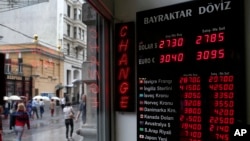Turkey's financial markets plummeted Monday following elections in which the ruling Justice and Development Party, or AKP, lost its parliamentary majority. With the country heavily dependent on financial inflows due to a large current account deficit, analysts warn that a protracted period of political instability could trigger an economic crisis.
The AKP’s loss of its parliamentary majority in Sunday’s elections and the prospect of coalition government were greeted by heavy falls in both the currency and stock markets Monday. The markets have subsequently recovered some of the losses, and Inan Demir, chief economist for Istanbul-based Finance Bank, said the sell-off was a knee jerk reaction to the unexpected election results.
"The initial reaction to [the prospect of] a coalition [government], [was] to sell and ask questions later. But after the contours of the coalition become more evident, the markets maybe [are] in the mood to buy again. A lot will depend on who is managing the economy, are there any safe pairs of hands that we know from the past. Those will be the issues monitored by the markets," said Demir.
Analysts say the financial markets had been expecting the AKP to lose some support, but not its majority. While some calm has been restored to markets, Atilla Yesilada, an Istanbul-based consultant for Global Source Partners, a political and economic consulting firm, warns the markets may be too optimistic and that further turmoil could lie ahead.
"This is only the first stage. A lot of people are still betting ... the AK would be able to cobble [together] an easy coalition. I don't think that it is easy as it looks. We should look at scenarios of not including AKP, and one that is solely focused on punishing AKP and on ... corruption accusations as well as [an] early election ... If it becomes certain that AKP would not be able to form a coalition, there would be another sell off," said Yesilada.
All of Turkey's opposition party leaders have so far refused to join the AKP in forming a coalition government, although the right-wing Nationalist Action Party is still viewed as the most likely coalition partner.
'Fundamentals'
But Cengiz Aktar, a political scientist of Istanbul’s Suleyman Sah University, said Monday's sell-off in the financial markets wasn't just about the parliamentary election.
"It's because the Turkish fundamentals are alarming that the markets are reacting [this way]," said Aktar.
These "fundamentals" include a sluggish economy, rising unemployment and inflation. Added to that, Turkey is running one of the largest current account deficits in the world. The deficit is covered by borrowing from abroad.
But analyst Yesilada warns that with the U.S. Federal Reserve due to raise interest rates later this year, the days of cheap borrowing from abroad are coming to an end and that could spell trouble for Turkey’s new government.
"The bonanza is over. All the emerging nations need to be prudent. They are in a beauty contest, to endear themselves to the investors, by reforming. And Turkey needs to have a government that .. can explain to the constituents that belt tightening is necessary. Without a steady government, in any kind of adverse scenario, Turkey is portrayed as one of the disaster cases," said Yesilada.
No coalition government in Turkey has ever successfully completed its term in office. Analysts warn the threat of early elections will make it more difficult for any coalition government to introduce necessary but unpopular economic measures. Thus, for whoever succeeds in forming the next government, that success could turn out to be a poisoned chalice.




